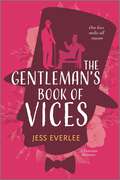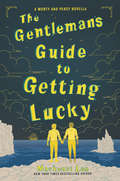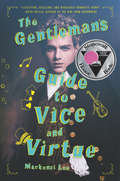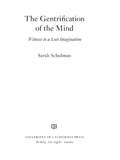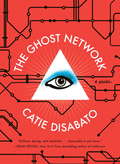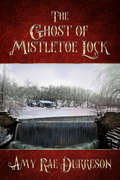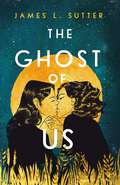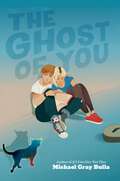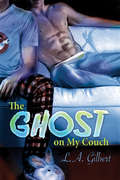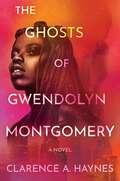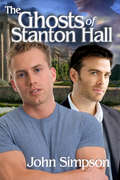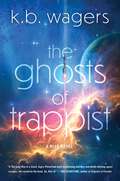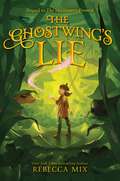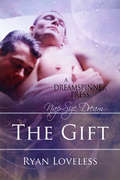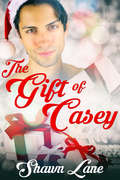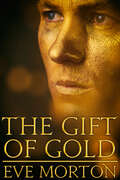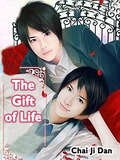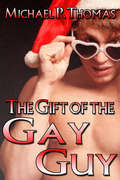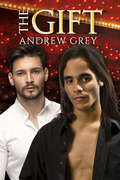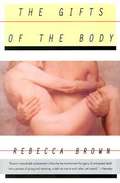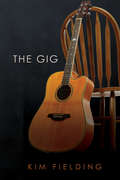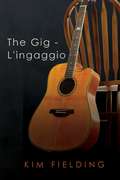- Table View
- List View
The Gentleman and His Vowsmith
by Rebecca Ide&“A delectable read.&” —C.S. Pacat, New York Times bestselling author A young lord, his future bride, and his former lover become unlikely allies to survive a deadly mystery in this spine-tingling historical fantasy of magic, murder, and steamy encounters.Lord Nicholas Monterris is trapped. The only heir to a declining dukedom, Nic is destined for a marriage of convenience. What he doesn&’t expect is for his bride to be Lady Leaf Serral, daughter of his father&’s hated rival. Tradition dictates the families are confined together while the marriage contract is crafted, which should be the worst part. Until Nic learns the Serrals&’ head negotiator is master vowsmith Dashiell sa Vare—beautiful, perfect Dashiell sa Vare—an old flame he has neither forgiven nor forgotten. Nic&’s only defense is false smiles and too much wine. When a dead body turns up, tension within the castle thickens. The first death is brushed off as an unfortunate accident, but a second reveals something sinister is unfolding at Monterris Court. As accusations fly and long-buried secrets surface, Nic must work with his former lover and his future bride to uncover a devious mastermind before they claim another victim. &“One part sweet and swoony romance, one part magic-infused mystery, and thoroughly enjoyable on all counts!&” —Maiga Doocy, author of Sorcery and Small Magics
The Gentleman's Book of Vices: A Gay Victorian Historical Romance (Lucky Lovers of London #1)
by Jess EverleeIs their real-life love story doomed to be a tragedy, or can they rewrite the ending?London, 1883Finely dressed and finely drunk, Charlie Price is a man dedicated to his vices. Chief among them is his explicit novel collection, though his impending marriage to a woman he can&’t love will force his carefully curated collection into hiding.Before it does, Charlie is determined to have one last hurrah: meeting his favorite author in person.Miles Montague is more gifted as a smut writer than a shopkeep and uses his royalties to keep his flagging bookstore afloat. So when a cheerful dandy appears out of the mist with Miles's highly secret pen name on his pretty lips, Miles assumes the worst. But Charlie Price is no blackmailer; he&’s Miles's biggest fan.A scribbled signature on a worn book page sets off an affair as scorching as anything Miles has ever written. But Miles is clinging to a troubled past, while Charlie&’s future has spun entirely out of his control…Carina Adores is home to romantic love stories where LGBTQ+ characters find their happily-ever-afters.Lucky Lovers of LondonBook 1: The Gentleman's Book of Vices
The Gentleman's Guide to Getting Lucky (Montague Siblings Novella #1.5)
by Mackenzi Lee“The queer teen historical you didn’t know was missing from your life.” — Teen Vogue, on The Gentleman’s Guide to Vice and VirtueIn this funny and frothy novella that picks up where the New York Times bestselling The Gentleman’s Guide to Vice and Virtue leaves off, freshly minted couple Monty and Percy fumble through their first time together.Monty’s epic grand tour may be over, but now that he and Percy are finally a couple, he realizes there is something more nerve-wracking than being chased across Europe: getting together with the person you love.Will the romantic allure of Santorini make his first time with Percy magical, or will all the anticipation and build-up completely spoil the mood?
The Gentleman's Guide to Vice and Virtue (Montague Siblings #1)
by Mackenzi Lee<P>A hilarious and swashbuckling stand-alone teen historical fiction novel, named one of summer's 20 must-read books by Entertainment Weekly! <P>A young bisexual British lord embarks on an unforgettable Grand Tour of Europe with his best friend/secret crush. An 18th-century romantic adventure for the modern age written by <i>This Monstrous Thing</i> author Mackenzi Lee—<i>Simon vs. the Homo Sapiens Agenda</i> meets the 1700s. <P>Henry “Monty” Montague doesn’t care that his roguish passions are far from suitable for the gentleman he was born to be. But as Monty embarks on his grand tour of Europe, his quests for pleasure and vice are in danger of coming to an end. Not only does his father expect him to take over the family’s estate upon his return, but Monty is also nursing an impossible crush on his best friend and traveling companion, Percy. <P>So Monty vows to make this yearlong escapade one last hedonistic hurrah and flirt with Percy from Paris to Rome. But when one of Monty’s reckless decisions turns their trip abroad into a harrowing manhunt, it calls into question everything he knows, including his relationship with the boy he adores. <P>Witty, dazzling, and intriguing at every turn, <i>The Gentleman's Guide to Vice and Virtue</i> is an irresistible romp that explores the undeniably fine lines between friendship and love. <P><b>A New York Times Bestseller</b> <P><b>Stonewall Honor Winner</b>
The Gentrification of the Mind: Witness to a Lost Imagination
by Sarah SchulmanIn this gripping memoir of the AIDS years (1981-1996), Sarah Schulman recalls how much of the rebellious queer culture, cheap rents, and a vibrant downtown arts movement vanished almost overnight to be replaced by gay conservative spokespeople and mainstream consumerism. Schulman takes us back to her Lower East Side and brings it to life, filling these pages with vivid memories of her avant-garde queer friends and dramatically recreating the early years of the AIDS crisis as experienced by a political insider. Interweaving personal reminiscence with cogent analysis, Schulman details her experience as a witness to the loss of a generation's imagination and the consequences of that loss.
The Ghost Network
by Catie DisabatoHas the world's hottest pop star been kidnapped, joined a secret sect, or simply gone into hiding? The answer lies in the abandoned subway stations of Chicago . . . One minute insanely famous pop singer Molly Metropolis is on her way to a major performance in Chicago, and the next, she's gone. A journalist who's been covering Molly joins the singer's personal assistant in an increasingly desperate search to find her, guided by a journal left behind in her hotel room, and possible clues hidden in her songs--all of which seem to point to an abandoned line in the Chicago subway system. It leads them to a map of half-completed train lines underneath Chicago, which in turn leads them to the secret, subterranean headquarters of an obscure intellectual sect--and the realization that they've gone too far to turn back. And if a superstar can disappear without a trace . . . what can happen to these young women? Suspenseful and wildly original, The Ghost Network is a novel about larger-than-life fantasies--of love, sex, pop music, amateur detective work, and personal reinvention. Debut novelist Catie Disabato bursts on the scene with an ingeniously plotted, witty, haunting mystery.From the Trade Paperback edition.
The Ghost of Mistletoe Lock
by Amy Rae DurresonAfter lonely divorcé Isaac leaves his job as a banker to work as a conservationist on a country river, he gives up on finding the love he always wanted. Then he meets flirty jeweler Ryan and assumes Ryan's out of his league, but Ryan's just as lonely as Isaac. Ryan also has the housemates from hell, and when he storms out of the riotous Christmas party they forgot to warn him about, he soon finds himself lost in the snow. Ryan passes out in front of the lock cottage where Isaac lives, and once Isaac brings him in from the cold, they finally have a chance to get to know each other. But when their insecurities get in the way, it's up to the ghost of Mistletoe Lock to ensure they give love a chance.
The Ghost of Us
by James L. Sutter"I was in a slump where I hated everything I read, and The Ghost of Us lifted me right out of it. Absolutely fantastic." —Dan Wells, bestselling author of I Am Not a Serial KillerOne Last Stop meets Cemetery Boys in this swoony YA romance from beloved author James L. Sutter.Eighteen-year-old ghost hunter Cara is determined to escape life as a high school outcast by finding proof of the supernatural. Yet when she stumbles upon the spirit of Aiden, a popular upperclassman who died the previous year, she learns that ghosts have goals of their own. In the wake of his death, Aiden’s little sister, Meredith, has become a depressed recluse, and Aiden can’t pass on into the afterlife until he knows she’ll be okay. Believing that nothing pulls someone out of a slump like romance, he makes Cara a deal: seduce Meredith out of her shell and take her to prom, and Aiden will give Cara all the evidence she needs for fame. If not, well—no dates, no ghost.Wooing the standoffish Meredith isn’t going to be easy, however. With Aiden’s coaching, Cara slowly manages to win Meredith over—but finds herself accidentally falling for her in the process. Worse yet: as Meredith gets happier and Aiden’s mission nears completion, his ghost begins to fade. Can Cara continue to date Meredith under false pretenses, especially if it means Aiden will vanish forever? Or should she tell Meredith the truth, and risk both of them hating her? And either way, will she lose her only shot at proving ghosts are real?
The Ghost of You
by Michael Gray BullaFrom the author of If I Can Give You That comes an emotional novel that follows a transgender teen who must grapple with a friendship fracturing and a new romance blossoming, all while being haunted by a devastating loss. A must-read for fans of How It Feels to Float and The Ghosts We Keep.Caleb’s world broke the day his brother died of a drug overdose. Now in the throes of grief, Caleb hardly ever sees his friends anymore, and school isn’t much better. He’s on the verge of failing his songwriting class, never mind that music used to be his greatest passion. Even Tanya, his best friend, is growing tired of trying to push him back into his life.But perhaps most concerning of all: A black cat has been following Caleb around…a cat that only he can see. A cat that may just be a ghost.Then Caleb is assigned a songwriting partner in class: Emmett, the nonbinary lead singer of a local punk band. The cat takes a liking to Emmett—and maybe Caleb does, too. As they write together, Caleb begins opening up about his grief, and the two realize they have more in common than expected. Now Caleb will have to decide if he is ready to heal with Emmett’s help—or recede in life and become as invisible as the ghostly cat at his heel.
The Ghost on My Couch
by L. A. GilbertAlex Tanner is a male nurse who divides his time between his job and his television schedule. His idea of the perfect partner, like so many other people's, is a tall, dark, and handsome man. Preferably alive and breathing. Surely that's not asking too much? Then an uninvited guest--a ghost, of all things--forces Alex to question what he's always looked for in a lover and his definition of what makes a person so beautiful.
The Ghosts of Gwendolyn Montgomery: A Novel
by Clarence A. HaynesIn a fast-paced, sexy, ghostly adventure, a publicist at the top of her game must confront her secret mystical past. To be a client of Gwendolyn Montgomery—New York&’s most powerful publicist, at Sublime Creative—is to be infused with a certain oomph, a mysterious glamour. She seems to have created the ideal life with her handsome new boyfriend, the perfect match. But Gwendolyn has a legion of long-buried secrets that could unravel everything. After a grisly, bizarre incident at the Brooklyn Museum, Gwendolyn begins to realize that something nefarious is happening tied directly to her past, right as Fonsi Harewood comes back into her world. Fonsi is a queer Latinx psychic from the South Bronx who&’s caught up in a love triangle with a ghost and his mortal ex. He&’s able to communicate with the dead, and he comes with a dire warning for Gwendolyn, that the barrier between humans and spirits is weakening. Gwendolyn would prefer not to have anything to do with ghostly drama. Yet in order to get to the bottom of the spookiness derailing her life and threatening the world, she must face the demons she&’d long left behind. The Ghosts of Gwendolyn Montgomery is a sensuous, funny, mystical adventure that will leave you spellbound as you keep the pages turning.
The Ghosts of Stanton Hall
by John SimpsonAfter his uncle dies, Ryan Belcrest inherits the old stately home and grounds of Stanton Hall. Once he moves in, he asks the handsome Mark Salisbury, his family attorney, to hire him a gay butler. Ryan interviews Scott and hires him for the live-in position--and Mark immediately sees Scott as competition for Ryan's affections. Then Ryan finds a journal describing odd events and ghostly happenings in the house. At first Ryan dismisses his uncle's scribbled ravings... but then he sees a ghost! While trying to sort out what to do about Scott and Mark, Ryan discovers that the phantoms may be connected to past crimes and the abandoned family crematorium, and the only way to appease the ghosts of Stanton Hall and live happily ever after is to see justice served.
The Ghosts of Trappist (NeoG #3)
by K. B WagersNeoG—the Near-Earth Orbital Guard, a diverse military force that patrols and protects the solar system, inspired by the real-life mission of the Coast Guard—and the crew of Zuma’s Ghost are under attack, and shocking truths are about to be exposed. What the black takes should stay in the black.Ensign Nell “Sapphi” Zika has been working hard to get past her trauma, but the unnerving pleas for help she’s hearing in the Verge and the song she can’t get out of her head are making that increasingly difficult. As Zuma’s Ghost gears up for a final run at the Boarding Games, their expert hacker is feeling anything but confident. Plus, her chief’s robot dog, Doge, is acting weird—a computer problem she can’t find an answer to—and the increasing number of missing freighters is putting everyone living on or stationed around Trappist on edge.It doesn’t help the NeoG’s mission that Dread Treasure is sidelined from competing in the Boarding Games, and Commander D’Arcy Montaglione is stuck on the front lines of the mystery of the missing ships while also stuck in his own head. Never good at trusting people to begin with, he’s struggling to piece together his new crew in the aftermath of a great betrayal, knowing this may be his final chance at command. The last thing he wants to do is prove his enemies right and end up getting shoved behind a desk and forgotten. The easy answer to missing ships is pirates, but D’Arcy soon realizes the easiest answer is rarely the right one out in the vacuum of space. What’s worse is that the actual pirates are scared of something out beyond the asteroid belt. Something that’s been taking their ships too…As the unknowns multiply and one of their mysterious enemies escalates by launching an attack on the NeoG itself, the Interceptor crews must brave both cyber and outer space to hunt down their foes, but no one is prepared for the truth that is revealed or the way it will shake the foundations of everything they believe about the universe.
The Ghostwing's Lie
by Rebecca MixThe second and final book in a stunning middle grade fantasy duology about a young fairy who has always lived in her heroic grandmother’s shadow but now must step up and embark on a quest to save her world—from New York Times bestselling YA author Rebecca Mix.Something rots within the wood…Ary Mossheart has done the impossible: The terrarium is shattered, and her people are free. When the folk of Terra are welcomed in by the fairies of Siltshore, an abundant treetop village filled with light, food, and peace, Ary promises herself that her days of saving people are over. It’s time to be normal. Live the life her gran would have wanted; the one she never got back in Terra.But when fairies begin to disappear one by one and it becomes clear that Siltshore is not as safe as it seems, Ary Owl, and Briar will be pulled down dangerous paths as they try to unravel the strange magics of their new world—and the truth about the one they left behind. To save her new home, Ary will have to step into the role of hero once more. Except this time, if she fails, there will be no new world to escape to.
The Gift
by A. F. HenleyDoren was born with a powerful gift -- a gift he's managed to use to put him well on his way to becoming a star. But there is more to that gift than just musical talent, and as careful as Doren is to hide that fact, there are some who know of the power behind the sound, and all the ways they could abuse it.August's goal in life is simple: make an impact in the music industry. An opportunity to work as the personal assistant to Doren seems to be exactly the kind of break he needs to accomplish that goal.But all too often in life, simple becomes just another complication, especially when there are people whose goal is even simpler: destroy and dominate.
The Gift
by Ryan LovelessIt took Sean's life-threatening illness to make Lucas realize he was in love with his friend. Now that Sean has recovered, Lucas is determined to give him a birthday gift that will express the feelings he hasn't managed to voice... the gift of himself. However, when Lucas's past negative experiences get in the way, Lucas fears the gift will be ruined. Sean reminds him that Lucas promised him everything, and that's what Sean wants. In return, Sean will give Lucas a gift he never expected... unconditional love.Special Note: The author donates 10% of this story's royalties to the American Jewish World Service for their Haiti Earthquake Relief fund. Visit her fundraising page for more information. Read more about American Jewish World Service's Mission.
The Gift of Casey
by Shawn LaneCasey Mackenzie unexpectedly finds himself in need of a “boyfriend” for his Thanksgiving dinner. For several months, Casey has been putting off family questions and invites with talk of his boyfriend “George.” Only now they actually expect to meet George at the holiday dinner.George Accardo is Casey’s sexy neighbor who also happens to be an actor Casey once had a rather drunken rendezvous with. Casey has avoided George ever since. Until now.Casey offers George fifty bucks to pretend to be his boyfriend for the duration of the Thanksgiving dinner. George has been intrigued by Casey since their first meeting but gave him space when Casey freaked. He accepts the job, though Casey assures him they will “break up” before Christmas.Casey finds himself still charmed by George as Christmas approaches. Can George convince Casey he’s the gift he’s been hoping for before the holiday arrives?
The Gift of Gold
by Eve MortonGideon's father's a liar and a gambler, which means Gideon must pay for his mistakes. He's done it in the past, and he'll do it in the future. This instance with the King should be no different.But when Gideon's father claims his son can spin straw into gold, Gideon is captured and forced into a locked room filled with a substance that only makes him sneeze and his eyes water. The King's men intimidate him and the King demands perfection. Gideon knows nothing of magic, so what will become of him?Just as Gideon believes his life is over, a small man shows up and offers Gideon a lesson in the gift of gold. The price for this lesson is quite simple, though carnal. Will Gideon agree? Or will his pride stop him from saving his own life?
The Gift of Life: Volume 1 (Volume 1 #1)
by Chai JiDanWhen he was twelve years old, he was walking home and "brought" back to a dirty little beggar. Later on, the little beggar became his younger brother, and he became the little beggar's older brother …When they were children, they relied on each other for survival. When they grew up, they returned to the street where they met before. They only smiled at each other. Happiness turned out to be so simple …
The Gift of Life: Volume 2 (Volume 2 #2)
by Chai JiDanWhen he was twelve years old, he was walking home and "brought" back to a dirty little beggar. Later on, the little beggar became his younger brother, and he became the little beggar's older brother …When they were children, they relied on each other for survival. When they grew up, they returned to the street where they met before. They only smiled at each other. Happiness turned out to be so simple …
The Gift of the Gay Guy
by Michael P. Thomas‘Tis the night before Christmas when Derrick Halvorson’s flight to Minneapolis is diverted to a tiny municipal airport out in the sticks. Grounded by a blizzard, he lucks into the last hotel room in town, which he offers to share with Lee, a tall, tempting twink from his flight with nowhere else to go. The sex is awesome, but when Derrick catches Lee stealing what little cash he has in his wallet, he tosses the guy out. When Lee resurfaces in the morning, Derrick resolves to stay mad, so no one is more surprised than he is when he turns up at the Halvorson Family Christmas with Lee in tow. When his cop brother recognizes Lee, Derrick fears the worst. Is Lee actually a career criminal? Or was taking the money a desperate one-off? Lee can always pay back the sixty dollars, but will the punishment fit the crime if he steals Derrick's heart?
The Gift: A Gospel Suspense Story (Las Vegas Escorts #2)
by Andrew GreySequel to The PriceLas Vegas Escorts: Book TwoEmber is a drop-dead gorgeous Las Vegas escort. He notices Alejandro in some of the classes he teaches at his side business--a yoga studio. Then, color-blind Alejandro further captures Ember's attention when he's momentarily blinded by a quick change in light and needs Ember's help at a club. What Ember doesn't expect is the way Alejandro touches his heart. Alejandro never intended to develop feelings for Ember. He's in Las Vegas for a year to sow some wild oats. But Alejandro quickly sees more in Ember when he sets out to make some of Alejandro's dreams come true--including a trip to the Grand Canyon and the beaches of LA. Alejandro's wild oats could turn into something memorable. Ember knows keeping his escort job from Alejandro isn't the right thing to do, but he wants to be liked for who he is. Alejandro keeps his own secrets for the same reason. But Alejandro's family obligations, along with Ember's profession, could make it impossible for the two of them to stay together--unless they can figure out how to make the most of the gifts they've been given.
The Gifts of the Body
by Rebecca BrownA woman volunteer who cares for people with AIDS narrates a poignant account of the clients she comes to love in her role as a home-care aide, in a bittersweet novel about life, illness, death, and remembrance. By the author of The Children's Crusade.
The Gig (Speechless #2)
by Kim FieldingSequel to SpeechlessA Bones/Speechless CrossoverAn accident in Drew Clifton's past left the former novelist with aphasia, unable to communicate through either speech or writing. Through sheer strength of will, he built a quiet but lonely life for himself. But now he's fallen in love with Travis Miller. Travis has his own issues--a permanent eye injury and unemployment. But he's determined to help Drew find ways to engage and succeed again in the wider world, and a guitar-playing gig at a local coffeehouse seems like a good start. Dylan Warner and Chris Nock happen to be in the audience that evening, and they have a few niggling problems of their own. Perhaps a chance meeting will provide solutions that might benefit all of them.
The Gig - L'ingaggio (Senza parole #2)
by Kim Fielding Dreamspinner Italian TeamSeguito di Senza paroleUn crossover di Un buono scheletro e Senza paroleIn seguito a un incidente, l'ex romanziere Drew Clifton comincia a soffrire di afasia: non è in grado di comunicare né verbalmente né per iscritto. Solo grazie alla sua forza di volontà è riuscito a costruirsi una vita tranquilla ma solitaria. Ora, però, si è innamorato di Travis Miller. Anche Travis ha i suoi problemi: ha perso un occhio e il lavoro. È però determinato ad aiutare Drew a confrontarsi di nuovo con successo col mondo, e un ingaggio in una caffetteria della zona per suonare la chitarra sembra un inizio promettente. Dylan Warner e Chris Nock sono tra il pubblico proprio quella sera, anche loro con qualche fastidioso problema. Forse da quell'incontro casuale nasceranno delle opportunità che beneficeranno tutti loro.

